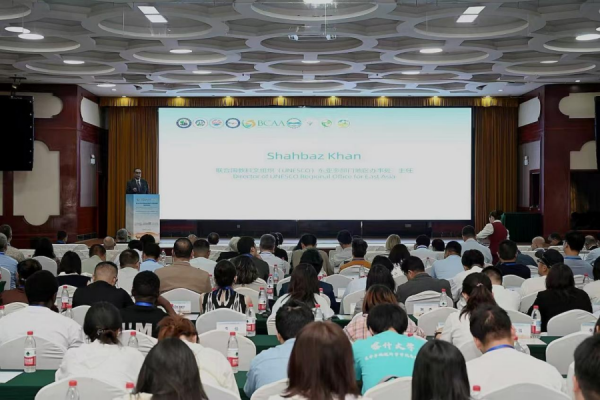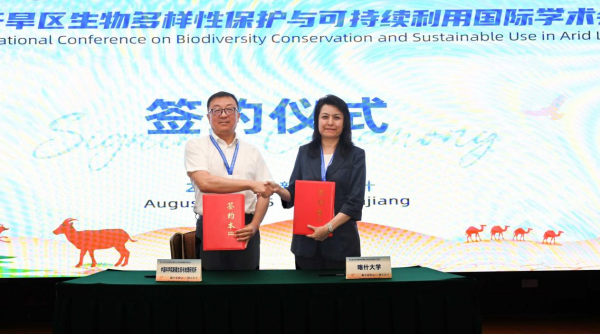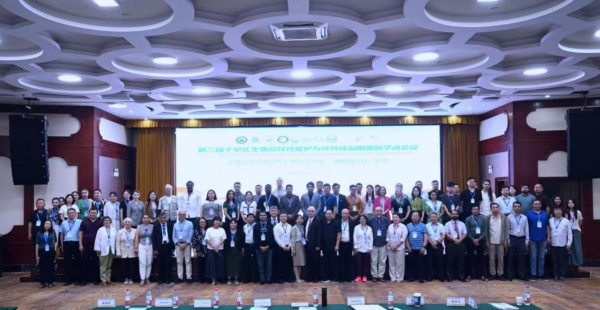The 3rd International Conference on Biodiversity Conservation and Sustainable Use in Arid Lands Held in Kashi
2025-08-13
On August 7–8, the 3rd International Conference on Biodiversity Conservation and Sustainable Use in Arid Lands was successfully held in Kashi. The event was hosted by the Xinjiang Institute of Ecology and Geography (XIEG), Chinese Academy of Sciences (CAS), and co-organized by Kashi University, the China-Tajikistan Belt and Road Joint Laboratory on Biodiversity Conservation and Sustainable Use, the CAS Research Center for Ecology and Environment of Central Asia, the Biodiversity Conservation Alliance for Arid Lands, Namangan State University of Uzbekistan, the Xinjiang Botanical Society, the Xinjiang Zoological Society, and the Xinjiang Geographical Society.
The conference brought together more than 100 experts from 21 countries, including China, Kazakhstan, Tajikistan, Uzbekistan, Kyrgyzstan, Turkmenistan, Azerbaijan, Georgia, Armenia, Germany, Italy, Belgium, the United States, Mongolia, Pakistan, and Nepal.

Group Photo (Image by XIEG)
In his welcome speech, ZHANG Yuanming emphasized that biodiversity is the cornerstone for maintaining ecological balance and the foundation of human survival and development. As an integral part of the global ecosystem, arid lands embody a unique biodiversity and cultural heritage. At the same time, they also face severe challenges, including climate change, land degradation, and water scarcity. Striking a balance between conservation and development, and exploring innovative approaches for the sustainable resource use, remains a critical challenge. He urged all stakeholders in arid lands to work together and translate commitments on biodiversity conservation into concrete policies, actions, and outcomes.
LIU Ning, Director General of the Department of Nature and Ecology Conservation at the Ministry of Ecology and Environment of the People's Republic of China, stated that China remains committed to fulfilling its obligations under the Convention on Biological Diversity and continues to promote the effective implementation of the Kunming-Montreal Global Biodiversity Framework. He expressed hope that this conference would provide an opportunity for countries in arid lands to deepen cooperation, enhance exchanges, and strengthen collaboration among researchers, jointly improve species databases in arid lands and carry out cross-border research and development on ecological restoration technology, thus contributing to regional biodiversity conservation and sustainable development.
Shahbaz Khan, Director of the UNESCO Multisectoral Regional Office for East Asia, stated that the Kunming-Montreal Global Biodiversity Framework establishes the "30×30" target—to protect at least 30% of the global land, freshwater, and ocean ecosystems by 2030. He also emphasized the need for inclusive governance, the integration of indigenous knowledge systems, and the establishment of comprehensive monitoring mechanisms to ensure the effective implementation of the target.
Jilili Helili, Deputy Director of the Department of Science and Technology in Xinjiang, stated that Xinjiang as a frontline region in arid-land ecological conservation, has always upheld openness and cooperation. It will actively cooperate with scientists worldwide to develop strategies for biodiversity conservation and sustainable resource use, explore sustainable development models that integrate ecological protection with economic and social development, contributing “Xinjiang wisdom” to the global ecological civilization.
SUN Hui, Head of the Division of International Organizations at the Bureau of International Cooperation, Chinese Academy of Sciences, stated that the conference has fostered scientific cooperation and knowledge sharing in biodiversity conservation for arid lands. He emphasized that the CAS places great importance on international collaboration and, by implementing international scientific projects and establishing overseas research and education centers, has continuously expanded its global cooperation network and advanced scientific excellence.
In his video address, Tristan Tyrrell, Programme Management Officer at the Secretariat of the Convention on Biological Diversity (SCBD), highly praised the “Declaration on Conserving Biodiversity and Building a Community of All Life in Arid Lands,” initiated by XIEG. He also commended the value of the jointly launched Biodiversity Conservation Alliance for Arid Lands (BCAA). He emphasized that governments, communities, academic institutions, non-governmental organizations, and the private sector all play important roles in co-creating knowledge, implementing restoration, and ensuring the fair and equitable sharing of conservation benefits.
Palidan Tursu, President of Kashi University, stated in her remarks that Kashi University will further leverage its geographical advantages and resource endowments, and proactively build platforms and create favorable conditions for cooperation in biodiversity conservation and the study of arid-land ecosystems.
The conference was held under the theme "Open Science and Knowledge Sharing to Empower the 30x30 Target in Arid Lands." It featured five parallel sessions: Open Science and Biodiversity Knowledge Sharing, Protected Area Planning and Conservation Effectiveness Evaluation, Trans-boundary Biodiversity Conservation and Biological Invasions, Responses and Adaptations of Biodiversity in Arid Lands to Global Change, and Technological Innovations Driving Biodiversity Conservation Practices in Arid Lands. In addition, two roundtable discussions were conducted: “How Biodiversity Conservation in Arid Lands Can Support the Implementation of the Kunming-Montreal Global Biodiversity Framework, and Interdisciplinary Approaches in Promoting Biodiversity Conservation in Arid Lands.
The conference invited nine esteemed experts to deliver keynote speeches,and 42 experts from 16 countries to present the latest advancements on related topics. Meanwhile, 10 experts shared their perspectives during the roundtable discussions.
This conference marks a significant step in implementing the "Declaration on Conserving Biodiversity and Building a Community of All Life in Arid Lands." Its outcomes and shared consensus have fostered scientific cooperation and knowledge sharing in the field of biodiversity research in arid lands, contributing to regional biodiversity conservation and sustainable development goals.
XIEG had hosted the International Conferences on Biodiversity Conservation and Sustainable Use in Arid Lands in 2021 and 2022. With the support from the Secretariat of the Convention on Biological Diversity (CBD), XIEG jointly issued the "Declaration on Conserving Biodiversity and Building a Community of All Life in Arid Lands", and launched the Biodiversity Conservation Alliance for Arid Lands (BCAA). Currently, the BCAA has brought together 17 member institutions. It strives to foster a community of life in arid lands through collaborative research, knowledge sharing, and capacity building, contributing to the achievement of the United Nations Sustainable Development Goals and the 2050 Vision on Biodiversity.
During the conference, XIEG and Kashi University signed a Cooperation Agreement. Both parties will form a comprehensive strategic partnership focused on discipline development, talent training, scientific research and innovation, international cooperation, academic exchanges, and resource sharing. This agreement will promote the cooperation of the China-Tajikistan Belt and Road Joint Laboratory on Biodiversity Conservation and Sustainable Use in transboundary biodiversity conservation and ecological environment monitoring on the Pamir Plateau.

Opening Ceremony (Image by XIEG)

Signing Ceremony (Image by XIEG)

Group Photo (Image by XIEG)
Contact
LONG Huaping
Xinjiang Institute of Ecology and Geography
E-mail: longhp@ms.xjb.ac.cn
Web: http://english.egi.cas.cn



